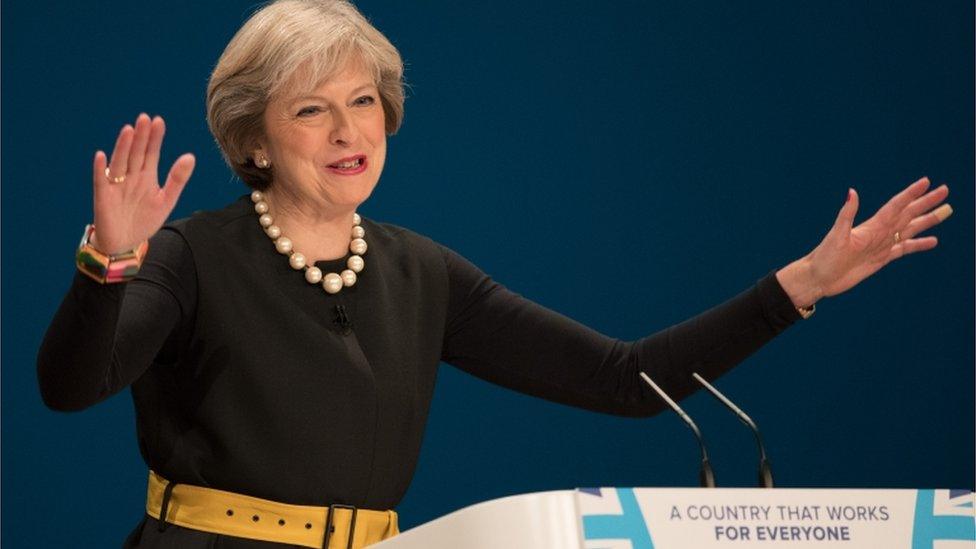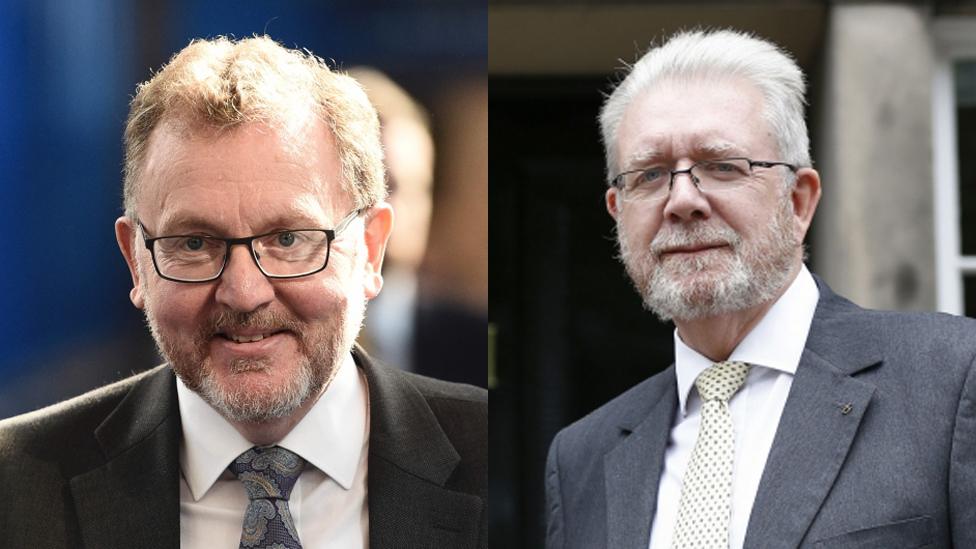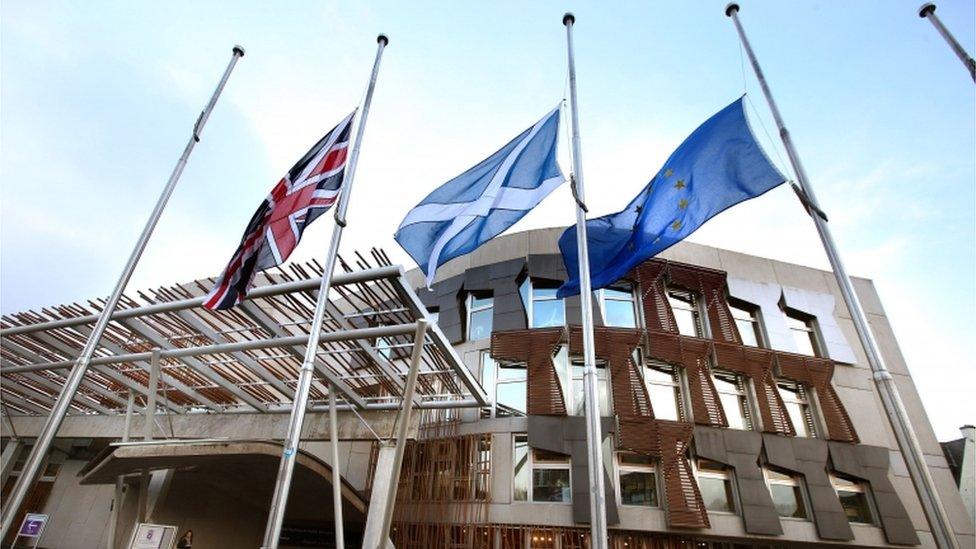Theresa May 'still wants to engage with Scotland'
- Published

Theresa May told the Tory conference that Brexit negotiations would be carried out by the UK government alone
The prime minister still wants to engage with the Scottish government ahead of the UK's Brexit negotiations, the Scottish secretary has insisted.
But David Mundell warned against using Brexit as a pretext for a "rehash" of the independence referendum.
In a conference speech on Sunday, Theresa May referred to "divisive nationalists" who she accused of seeking to "undermine" the UK.
The reference was widely interpreted as being an attack on the SNP.
The Scottish government's Brexit minister, Mike Russell, said Mrs May's language had been "inflammatory" and designed to reject the involvement of the devolved administrations, including Scotland, in Brexit talks.
He added: "I think we have seen a very unfortunate performance both from Theresa May and David Mundell, and from others, and I think they should calm down and consider the implications of it."
Mr Russell and Mr Mundell were both speaking to the BBC's Good Morning Scotland programme in the wake of Mrs May revealing that she would trigger Article 50 - which will formally start the process of the UK leaving the EU - by the end of March next year.
Mr Mundell told the programme: "I think Theresa May is still very clear that she wants to engage with all parts of the United Kingdom, including Scotland, as we move forward with the negotiations."

Mr Mundell (left) and Mr Russell were both interviewed by the Good Morning Scotland programme
But he said the UK government would not be giving a running commentary on negotiations, which he acknowledged would "provide an opportunity for people who like to snipe from the sidelines".
Mr Mundell added: "What I am looking to do is to build a negotiating position within the overall UK negotiating position that gets us the deal that people want.
"What I absolutely don't want to do, and the prime minister is very clear, is she doesn't want people who support breaking up the United Kingdom to use Brexit as a pretext for rehashing the independence referendum."
Mr Mundell also said he had not seen any evidence to suggest the Scottish government or Scottish Parliament could veto any Brexit developments.
And he repeated Mrs May's insistence that Scotland cannot stay in the EU while the rest of the UK exits.

Analysis by Brian Taylor, BBC Scotland political editor
Mr Russell and Ms Sturgeon are only too well aware of the limits of a Legislative Consent Motion (LCM). Suppose it is eventually conceded that an LCM there must be. That Holyrood must vote upon the EU departure bill.
Holyrood may then decline to give consent, but, at the pinch, UK Ministers may then say: "So Holyrood declines to consent? These things. How sad. We had hoped to proceed by consensus but hey and, indeed, ho. Westminster is sovereign. Onwards and upwards."
Not, you will readily understand, particularly good politics. Mrs May and her colleagues will indeed wish to proceed via consensus if possible. But the issue of sovereignty remains there, in the background. If needed.
For now, we await the detail. In particular, we await the triggering of Article 50 in the spring and the introduction of the Bill in the subsequent Queen's Speech. But matters are moving.

Mr Mundell added: "There isn't anybody over the last few months who has suggested any realistic or credible basis on which Scotland could somehow remain in the EU while the rest of the UK left.
"But of course we want to look at any options that reflect Scotland's best interests in terms of getting the best possible deal for Scotland and the UK."
Mr Mundell also said he could not see any prospect of the European single market being closed to Scotland despite Mrs May suggesting the UK was heading for a so-called "hard Brexit".
In her speech to the Conservative Party conference in Birmingham on Sunday, Mrs May said she would consult and work with the devolved administrations.
But she said negotiations between the UK and the EU were "the responsibility of the government and nobody else".

Scotland voted to remain in the EU while the UK as a whole voted to leave
She added: "There is no opt-out from Brexit. And I will never allow divisive nationalists to undermine the precious union between the four nations of our United Kingdom."
Mr Russell said her language had been "foolish" and "inflammatory" and questioned the prime minister's commitment to involving the devolved administrations in the Brexit process.
He added: "If the UK government is saying not only that we don't want you involved in the negotiations, but actually we're going to subvert the existing system of devolution in order to stop you saying anything, then that is heading towards a very, very serious situation.
"At the present moment what we are hearing is that we will not be part of the negotiations, yet there is some unspecified way in which the Scottish government, the Welsh assembly, the Northern Irish assembly, could be involved in some sort of discussion."
'Stop the noise'
Mr Russell said meetings would be held later this month in which there would need to be a "structure established that can allow the full engagement and full involvement of the Scottish government and the people of Scotland, because that is what the prime minister promised".
He also repeated his suggestion that a legislative consent motion for Mrs May's proposed "Great Repeal Bill", which would remove the 1972 treaty but also enshrine all existing EU law into British law, would have "great difficulty" passing the Scottish Parliament.
Mr Russell added: "Let's just stop the noise from the Tory party conference and let's sit down and have the conversations about something that will have a profound effect on Scotland, and which, incidentally, the people of Scotland did not vote for."